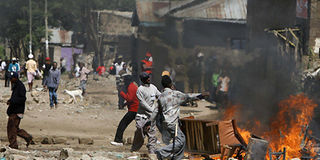Kenya pledges support for chaos probe

Photo/FILE
Irate youths at the height of the post-election violence in Nairobi in January 2008.
The Kenyan government has pledged to support ongoing investigations into post-election violence, a senior official of the International Criminal Court said on Tuesday.
Mr Phakiso Mochochoko, the head of Jurisdiction, Complementarity and Cooperation Division at the court, spoke after a meeting with the Cabinet committee on ICC.
The meeting was attended by Prof George Saitoti (Internal Security) Mr James Orengo (Lands), Mr Mutula Kilonzo (Justice), Mr Amason Kingi (East African Community), Maj-General Michael Gichangi (National Security Intelligence Services) and Mr Francis Kimemia (PS Internal Security).
At the same time, Attorney General Amos Wako has promised to appeal the ruling on the admissibility of the case.
Mr Wako blamed the rejection of Kenya’s bid to try the Ocampo Six locally on the slow implementation of judicial and police reforms and squabbles within government.
“The ultimate success of the government’s application will depend on the manner, speed, determination and unity with which we carry out constitutional reforms and in particular Judicial and Police reforms,” Mr Wako said in a statement issued in Geneva, Switzerland. (DOWNLOAD: AG Amos Wako's statement)
Mr Mochochoko said his trip was triggered by government attempts to defer the ICC cases.
“We have received reassurance and recommitment from the government but we will see whether they will change,” he said.
The ICC official said that if the government reneges on its promise to cooperate with the court, the matter will be referred to the Assembly of State Parties.
“In case of non-cooperation by any state party to ICC, we will report the matter to the judges. The judges, if satisfied, will make a finding of non-cooperation by that state and then they can refer the matter to the assembly of state, which is the highest political body of the ICC,” he said.
His team, he said, also wanted to know the kind of assistance the government needed in carrying out its investigations and the protection of witnesses.
He said that although the court did not have any witnesses in the country, it was investigating reports of harassment of potential witnesses.
He said the government had put in place the legal framework for witness protection, but there were some challenges that included funding, which need to be resolved.
“We wanted to assess the readiness of the government to protect witnesses in event of us sharing the evidence we have,” he said.
In Geneva, Mr Wako was categorical that the delays in the confirmation of nominees for the positions of Chief Justice and his deputy and the Director of Public Prosecutions (DPP) had cost the government the case.
“Any squabbling and acrimonious debate and delays in the timely implementation of the Constitution only served to send negative signals and would make it difficult for the government to succeed.
“Let us therefore resolve to pursue the reforms soberly, expeditiously and with maximum determination,” he said.
The AG issued the warning only a day after the ICC Pre-Trial Chamber II ruled that the cases against the Ocampo Six were admissible before the court.
Mr Wako was confident that the Appeal Chamber would review the decision on receiving the most current information on the post-election violence the three-judge bench declined to admit.
He added that he would, on Friday, meet the government’s British lawyers Sir Geoffrey Nice and Rodney Dixon in London to chart the way forward.
The government’s inaction against the Ocampo Six before challenging the admissibility of the cases at ICC led to the rejection of its case by the judges.
The government also appeared to have been exposed by the suspects, who though supporting the admissibility challenge, had indicated to the court that they were ready to fight on their own.




